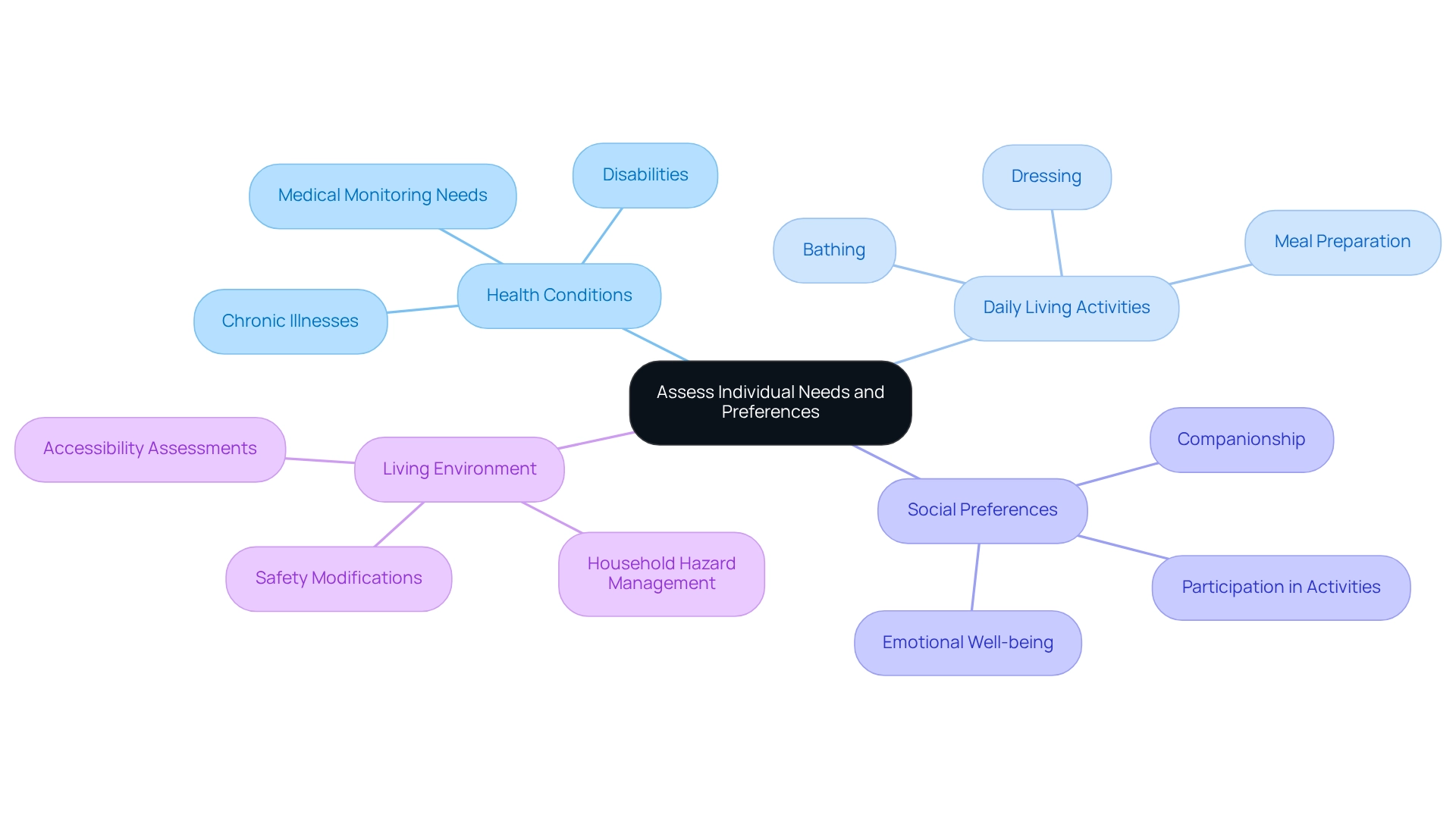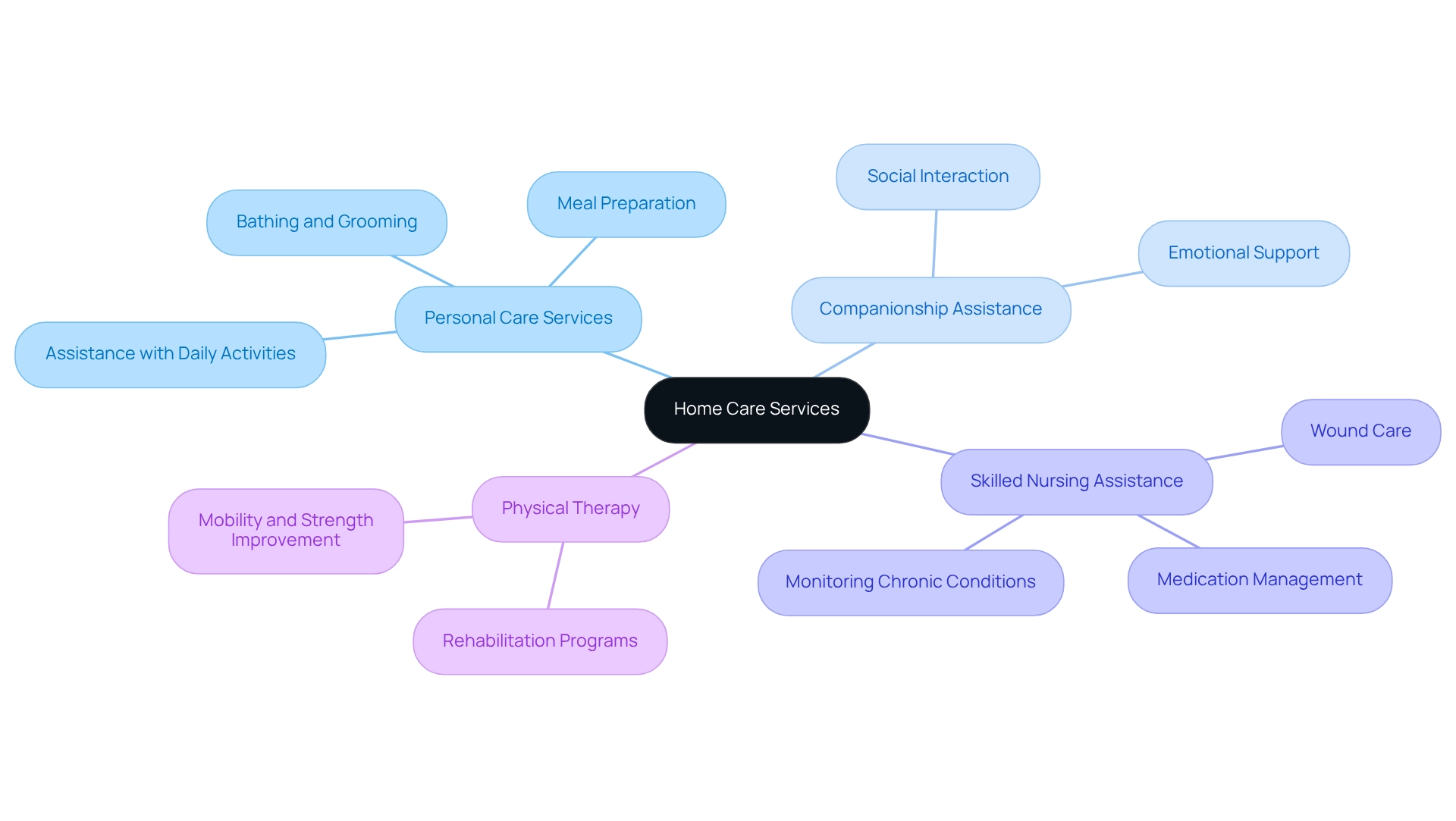Overview
Navigating assistance home care options can feel overwhelming, but we’re here to guide you through four essential steps that ensure you receive the care you deserve.
- Assess your individual needs; this step allows you to reflect on what support is truly necessary for your unique situation.
- Exploring available services can open up a world of possibilities tailored just for you.
- Evaluating care providers becomes crucial. This step emphasizes the importance of finding someone who understands your needs and can provide compassionate support.
- Understanding financial considerations is vital; planning ahead can ease worries and help you make informed decisions.
Each of these steps highlights the significance of personalized care and thorough evaluation. By engaging in this process, you ensure that the support you receive is not only appropriate but also nurturing and aligned with your circumstances. Remember, your comfort is our priority, and we’re here to help you every step of the way.
Introduction
Navigating the world of home care can feel overwhelming for families seeking the best support for their loved ones. With so many options available, it’s important to understand individual needs, explore various services, and evaluate potential providers. These crucial steps ensure that quality care is achieved. This article delves into essential considerations for families, from:
- Assessing personal preferences
- Understanding financial implications
- Selecting the right caregivers
By taking a comprehensive approach, families can enhance the quality of life for their loved ones and ease the stress associated with finding suitable home care solutions. Remember, we’re here for you every step of the way.
Assess Individual Needs and Preferences
To effectively navigate home support options, it is essential to start with a thorough evaluation of the individual’s physical, emotional, and social needs. This foundational step is crucial for customizing support to enhance quality of life. Key factors to consider include:
- Health Conditions: It’s important to identify any chronic illnesses or disabilities that necessitate specific care. Without proper medical monitoring and assistance, chronic conditions may worsen, leading to health decline. This highlights the need for targeted support.
- Daily Living Activities: Evaluate the individual’s ability to perform essential tasks such as bathing, dressing, and meal preparation. Many seniors struggle with these activities, and personalized assistance can significantly improve their quality of life and independence, preventing issues like poor nutrition.
- Social Preferences: Recognize their social requirements, including companionship and participation in enjoyable activities. Social interaction is vital for emotional well-being. Caregivers can alleviate feelings of loneliness and depression, contributing to improved mental health.
- Living Environment: Assess the safety and accessibility of their residence. Modifications may be necessary to create a secure environment, as household hazards can increase the risk of accidents. Professional caregivers can help manage household tasks, ensuring a safe living space.
Engaging in open conversations with the individual and their family is essential for gathering insights into preferences and concerns. This cooperative method not only builds trust but also ensures that the selected support services correspond with the person’s distinct requirements. By acknowledging the significance of professional support, families can lessen stress and anxiety, knowing that their loved ones are receiving high-quality assistance home care that is tailored to their needs. Furthermore, assistance home care services offer convenience and affordability, making them a feasible choice for numerous families.

Explore Available Home Care Services
When evaluating assistance home care options, it’s essential to understand the various types available to meet your unique needs. These services can be broadly categorized as follows:
- Personal Care Services: These include assistance with daily activities like bathing, grooming, dressing, and meal preparation. Such support ensures that elderly individuals maintain their dignity and quality of life.
- Companionship Assistance: Designed to offer social interaction and emotional support, these services help alleviate loneliness and enhance mental well-being, which is vital for seniors living alone.
- Skilled Nursing Assistance: Provided by registered nurses (RNs) or licensed practical nurses (LPNs), this type of support encompasses medical tasks such as medication management, wound care, and monitoring chronic conditions, ensuring health needs are effectively addressed.
- Physical Therapy: Rehabilitation programs aimed at helping individuals regain mobility and strength after illness or injury, fostering independence and improving overall physical health.
Engaging with local home assistance organizations is crucial for understanding the specific offerings they provide. Many organizations offer tailored solutions that align with personal needs, ensuring that assistance is both individualized and effective. Recent policy shifts are also reshaping the landscape of elder support, with an increasing emphasis on in-home services that enhance accessibility and relieve family burdens. As the demand for assistance home care continues to grow, understanding these options becomes ever more important for families seeking the best support for their loved ones. We’re here for you, and your comfort is our priority.

Evaluate Care Providers and Their Qualifications
When assessing potential care providers, it’s essential to consider several key criteria that resonate with your needs and concerns.
- Licensing and Accreditation: It’s important to confirm that the agency holds the necessary licenses and accreditations from relevant health authorities. This ensures compliance with industry standards and regulations, giving you peace of mind.
- Staff Qualifications: Investigate the qualifications and training of caregivers. Look for certifications in CPR, first aid, and any specialized training relevant to specific health conditions. These qualifications are crucial for providing safe and effective assistance.
- Reputation: Evaluate the agency’s reputation by examining online reviews, testimonials, and referrals from other families. A strong reputation often indicates the quality of service offered and the agency’s dedication to client satisfaction.
- Caregiver Matching: Inquire about the agency’s caregiver matching process. At Best Care Nurses Registry, we employ a streamlined method consisting of three straightforward steps to ensure personalized home health services. First, call (888) 203-2529 to speak with our friendly staff, who are ready to discuss your requirements and answer any questions you may have. Next, we’ll collaborate with you or your loved one to obtain a treatment plan from your doctor that ideally addresses your needs. Ultimately, we will connect you with empathetic caregivers of your choice, ensuring a trusting relationship that promotes effective support.
Additionally, conducting interviews with potential providers can provide deeper insights. Ask about their experience, approach to service, and emergency response protocols to ensure they align with your expectations and requirements. This comprehensive assessment procedure is crucial, particularly as the demand for assistance home care options continues to rise. Forecasts suggest a necessity for almost 924,000 personal support assistants and health aides by 2031. Moreover, the utilization of telehealth in residential support has risen by 154% since 2018, emphasizing the significance of assessing providers who may deliver these contemporary offerings. Lastly, consider eligibility and expense factors for assistance home care services, as these are essential elements for caregivers and seniors exploring domestic support options.
Understand Financial Considerations and Insurance Options
To effectively manage the financial aspects of assistance home care, it’s important to take a thoughtful approach. Begin by assessing costs: determine the average costs of the services needed, which can vary based on your location and type of care. For instance, home assistance rates in Wyoming average $34 per hour, providing a helpful perspective on what to expect.
Next, explore insurance options. Review long-term assistance insurance policies, Medicare, and Medicaid benefits to understand what services are covered. Many families find that long-term insurance can significantly reduce expenses, but it’s essential to dive into the details of each policy to ensure you’re fully informed.
Creating a budget is another crucial step. Include potential out-of-pocket expenses, not only for assistance but also for any additional charges, such as memory support, which typically incurs an extra cost of between $709 and $1,343 per month on top of assisted living or nursing facility fees. Additionally, exploring financial assistance options can provide relief. Programs like the Best Care Concierge Program connect you to a network of professionals—lawyers, financial advisors, guardians, case managers, social workers, and therapists—who can help you navigate these complexities with care.
Don’t forget to ask about payment plans. Inquire about payment options or sliding scale fees offered by assistance home care agencies to make services more affordable. These options can help make care more accessible and manageable for families.
Engaging in conversations about assistance home care before a crisis arises is vital for ensuring smoother transitions. Consulting with a financial advisor or elder law attorney can further ensure that all financial aspects are considered, empowering families to make informed decisions regarding their loved ones’ support. As Marlene Dietrich wisely noted, “There is a gigantic difference between earning a great deal of money and being rich,” reminding us of the importance of thoughtful financial planning in home care.
Conclusion
Understanding the intricacies of home care is essential for families who wish to provide the best support for their loved ones. By beginning with a thorough assessment of individual needs and preferences, families can tailor care to enhance the quality of life for seniors. Recognizing health conditions, daily living activities, social interactions, and the safety of the living environment lays the groundwork for effective home care solutions.
Exploring the various home care services available is equally important. From personal care and companionship to skilled nursing and physical therapy, these options cater to diverse needs, ensuring that each individual receives the appropriate level of support. Engaging with local home care agencies allows families to find personalized services that align with their unique requirements.
Evaluating potential care providers is a critical step in ensuring quality care. By examining their qualifications, reputation, and caregiver matching processes, families can make informed decisions that foster trust and effective care. Additionally, understanding the financial implications of home care, including costs, insurance options, and budgeting strategies, is vital for easing the financial burden on families.
Ultimately, navigating home care requires a comprehensive approach that emphasizes individual needs, service options, provider qualifications, and financial considerations. By taking these crucial steps, families can significantly enhance the well-being of their loved ones while alleviating the stress associated with finding suitable home care solutions. Prioritizing quality care not only improves the lives of seniors but also brings peace of mind to families, ensuring that their loved ones receive the support they truly deserve.
Frequently Asked Questions
Why is it important to assess individual needs and preferences for home support?
Assessing individual needs and preferences is crucial for customizing support to enhance the quality of life. It ensures that care is tailored to the specific physical, emotional, and social requirements of the individual.
What health factors should be considered when evaluating home support options?
Key health factors include identifying any chronic illnesses or disabilities that require specific care, as well as ensuring proper medical monitoring and assistance to prevent health decline.
How do daily living activities impact the need for home support?
Evaluating an individual’s ability to perform essential daily tasks such as bathing, dressing, and meal preparation is important, as many seniors may struggle with these activities. Personalized assistance can improve their quality of life and independence.
What role do social preferences play in determining home support needs?
Recognizing an individual’s social requirements, such as companionship and participation in enjoyable activities, is vital for emotional well-being. Social interaction helps alleviate feelings of loneliness and depression.
Why is it necessary to assess the living environment when considering home support?
Assessing the safety and accessibility of the residence is necessary to identify potential hazards that could increase the risk of accidents. Modifications may be needed to create a secure living space.
How can open conversations help in the assessment process for home support?
Engaging in open conversations with the individual and their family helps gather insights into preferences and concerns, builds trust, and ensures that the selected support services align with the person’s unique needs.
What are the benefits of professional support in home care?
Professional support in home care can reduce stress and anxiety for families, knowing their loved ones receive high-quality, tailored assistance. Additionally, home care services offer convenience and affordability for many families.











